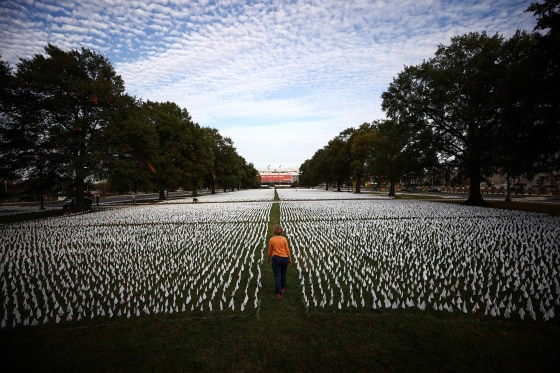As the world awaits the final vote tallies in the U.S. presidential election, many are channeling their angst and fears through social media. Some are responding by saying that what we all really need to do is work on loving one another. Memes and tweets are being shared that say, “Regardless of who won, our neighbors will still be our neighbors,” and some assert that people are taking this election too seriously.
The race may be over, but the endorphins are not flowing. We are still mad as hell. How could we not be, when so many ignored our pain in casting their vote?
These sentiments are clearly coming from people whose ability to live comfortably in the United States doesn’t hinge on the outcome. So please, spare me your toxic positivity.
Calls for “unity” and “harmony” indicate that some want us to forgive and forget. But before sharing that photo of a Donald Trump supporter shaking the hand of a Joe Biden supporter, remember that this isn’t a fight on the playground. These are the individuals who make the decisions that deeply affect the lives of marginalized groups. The record voter turnout in states across the country is an indicator that all is not well, and it should not be ignored.
Many Democrats and independents didn’t vote for Biden because he was our first choice, but because he was the only option for a restoration of sanity. We carried the trauma of the last four years — of being afraid to lose our rights and lives to Trump's policies and inaction — with us as we cast our ballots.
For people to assert that we’ve taken the election too seriously means they have never been racially profiled for driving a luxury car, like I have. That means they don’t know anyone who has died from Covid-19, like a disproportionate number of Black and brown people have. It means that they are not rushing to marry their same-sex partners, just in case. It means that they don’t fear harassment for being seen wearing a mask, like my Asian American friends. It means that they don’t care whether my friend’s spouse, a trans woman, can work and live without worrying about government-sanctioned discrimination.
My friends calling for unity have clearly forgotten that I was kicked out of a Lyft for asking my driver if he’d be wearing a mask. They’ve moved on from me being pulled over for needing air in my tire.
The race may be over, but the endorphins are not flowing. We are still mad as hell. How could we not be, when so many ignored our pain in casting their vote? While 59 percent of Americans were concerned about police violence toward minorities, Trump denied racism existed. While 78 percent of Americans expressed fears about Covid-19, we watched Trump supporters protest for the right to get haircuts.
Now we look at what a right-leaning Supreme Court could mean for our rights and our health care when it soon weighs the validity of the Affordable Care Act, which has protected those with pre-existing conditions. And we can’t shrug off Trump’s denigration of those protesting police brutality. The LGBTQ community can’t ignore how the Trump administration has sneakily rolled back their protections.
The more praise and complicity Trump received from his followers, the more he catered only to his base. So before you ask us to live in harmony, remember that his supporters went to the polls and voted against the interests of their LGBTQ, Black, brown, elderly, disabled and poor friends. His base didn’t seem to vote with us in mind, but as part of a grudge match against Biden and the president he served, Barack Obama.
Of course, the majority of us are already united, and our hearts are with every victim of police brutality and every homeless veteran. We want to protect our elderly from the coronavirus and losing their Social Security. We want to end climate change. And we want to protect Trump supporters from these things, too.
Indeed, rejecting the illusion of unity doesn’t mean that we’ll cause chaos or spread hate. It just means that we don’t need to extend any olive branches to those who voted for Trump or sat the election out. We aren’t monsters because we aren’t interested in meeting up for coffee or attending Thanksgiving dinner with our Trump-supporting family members.
Before calling us vindictive, petty or rude, realize that we are all exactly the same people we were the day we cast our ballot. Those ballots held vigil for John Lewis, John McCain, Elijah Cummings and Ruth Bader Ginsburg, who worked up until their last days for our sake — and yours. On Election Day, we let our empathy guide our votes, as we held space for those who Trump forgot in his attempts to prop up intolerance and flex his bravado. So ask yourself: Is the country inherently divided, or is the chasm being fueled by people who voted for Trump?


